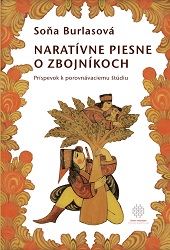Naratívne piesne o zbojníkoch: Príspevok k porovnávaciemu štúdiu, Etnologické štúdie, 22
Narrative Songs about Robbers: A Contribution to the Comparison Study, Ethnological Studies, 22
Author(s): Soňa Burlasová
Contributor(s): Eva Krekovičová (Editor), Judita Takáčová (Translator)
Subject(s): Cultural history, Customs / Folklore, Poetry, Recent History (1900 till today), Comparative Study of Literature, Slovak Literature, Cultural Anthropology / Ethnology, 18th Century, 19th Century, Theory of Literature
Published by: SAV - Slovenská akadémia vied - Ústav etnológie a sociálnej antropológie Slovenskej akadémie vied
Keywords: Narrative songs; Ethnological study; Robber songs; Song collections; Slovak literature; Slovak poetry; 18th-21st century poems; Slovak folklore;
Summary/Abstract: Slovak researchers have paid close attention to robber songs as a significant genre of Slovak folklore. The texts and melodies of robber songs are widely documented in numerous song collections, usually without any specific thematic classification. For example, Ján Kollár lists in Spievanky several robber songs in the section on Ballads, Romances and Fairy Tales. In his collection of ballads, K. Medvecký devoted specific sections to robber songs under the titles “Robber Songs” and “Gallows Songs” (pp. 109–122, 123–129). Horák’s selection of works of poetry, published in the same period, contains ten robber songs in volume I, section V. (The first song in this section, however, is not a robber song, which is explained in the comment). The big collector of Slovak folk songs K. Plicka focused mainly on lyrical robber songs. In his contribution, he provides examples of his own records and also presents his opinions on the melodies of robber songs. Historian J. Vilikovský5 examined the manuscript of the popular songs “O Surovec Jakubovi, zbojníkovi” (“AboutJakub Surovec, robber”), “Píseň o Jánošíkovi zbojníkovi” (“Song about Jánošík, robber”) and “Píseň o Adamovi a Ilčíkovi, zbojníkoch” (“Song about Adam and Ilčík, robbers”) which were disseminated by copying. The manuscript seems to date back to 1780. Even though these songs are artificial, there are clear relations in terms of texts and motifs between some of them (in particular the song about Jánošík) and folk tradition. Melicherčík’s book Jánošíkovská tradícia na Slovensku (Jánošík Tradition in Slovakia) should be considered a fundamental work about Slovak folklore with robber themes, just like a wide range of his studies published in journals. In these works, Melicherčík supported the perception of robber folklore as a documentation of people’s heroic, progressive and anti-feudal attitudes. This concept was later supported by V. Gašparíková who studied Michael Vdovec, a robber of regional (not national) importance, a typical representative of the robbery epilogue in Slovakia.
- E-ISBN-13: 978-80-970975-4-7
- Page Count: 120
- Publication Year: 2015
- Language: Slovak, English
- eBook-PDF
- Table of Content
- Introduction

